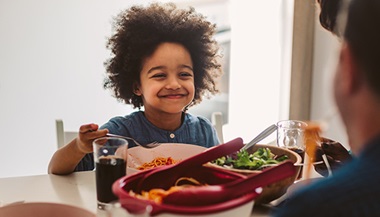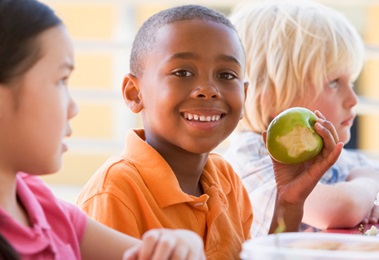Energy Drinks and Kids: What You Need to Know
Featured Experts
Energy drinks continue to climb in visibility and popularity among children and teens. Studies have found that almost one-third of teens ages 12 to 17 drink energy drinks regularly, and there are growing concerns that an increase in consumption by kids will lead to increased health issues.
Pediatric endocrinologist Stephanie Green, M.D., from Johns Hopkins Children’s Center, and Raquel Hernandez, M.D., M.P.H., director of the Healthy Weight Initiative at Johns Hopkins All Children’s Hospital, provide information to keep in mind when it comes to children and their best options for beverages.
What are energy drinks?
Energy drinks are beverages that usually contain high levels of caffeine, added sugars and legal stimulants used to increase alertness and energy.
Though energy drinks may help people’s endurance through the day in the short term, the caffeine they contain can have a drastic impact long after it has left their system, according to the American Academy of Child and Adolescent Psychiatry (AACAP).
Should kids drink energy drinks?
The American Academy of Pediatrics (AAP) has stated that energy drinks are not appropriate for children and adolescents, due to the high levels of caffeine these drinks contain.
“While 400 milligrams of caffeine each day appears to be safe for most healthy adults, the amount of daily caffeine that would be considered safe in children is not known, and the AAP recommends limiting use in children,” says Green.
In addition, the AACAP recommends that children between the ages of 12 and 18 should not consume more than 100 milligrams of caffeine per day and should avoid energy drinks entirely.
Effects of Energy Drinks on Kids
Due to children’s developing brains, decreased impulse control (placing self-imposed limits) and smaller body sizes, they are more susceptible to the effects and risks of caffeine ingestion. Children who consume caffeine can have difficulty sleeping and may develop behavioral or mental health issues, such as increased aggression, anxiety, stress and depression. Energy drinks provide those same effects, along with the added negative effects of sugar.
Additional adverse outcomes — especially after too much consumption — may include:
- Sleep disturbances
- Agitation
- Arrhythmias (abnormal heart beats)
- Diarrhea
- Feeling jittery
- Seizures
- Increased heart rate
- High blood pressure
- Rapid breathing
- Dehydration
- Anxiety and panic attacks
Sports Drinks vs. Energy Drinks
The major difference between sports drinks and energy drinks is that sports drinks do not contain caffeine. However, sports drinks do contain sugar, sodium and potassium, which help replenish nutrients and fluids for those undergoing high-intensity, long-lasting physical activity.
U.S. children and adolescents report consuming 17% of their calories from added sugars, nearly half of which are from more sugary drinks. Due to the presence of added sugars, however, it is not recommended that sports drinks be kids’ go-to drink for under an hour of vigorous activity, or as beverages during their meals or snack time, as they can lead to issues such as tooth decay and obesity. “Although sports drinks message about ‘replenishing of electrolytes,’ physical activity intensity for children rarely results in loss of electrolytes such that water is more than often enough to rehydrate children effectively,” Hernandez says. “Parents and children should know that drinking excess sugary beverages is the most common cause of excess weight gain. Therefore, eliminating sugary beverages can be the easiest yet most effective health strategy families and children can make.”
Healthy Alternatives to Energy Drinks for Kids
“No matter the person’s age, the best option for hydration in most circumstances is water,” says Green. “As a parent, it’s best to both offer water as a first choice and model the behavior of drinking water, so that your child sees it as the go-to way to quench their thirst.”
Parents can model this behavior by choosing water over other drinks and by serving water alongside their meals. Other alternatives include:
- Unsweetened coconut water
- Diluted 100% fruit juice
- Low-fat milk or milk alternatives
If your child needs electrolytes after sports practice, you can make your own sports drink. Mix 1/3 cup of 100% fruit juice with 2/3 cups of water and add a dash of salt. This offers a healthy dose of electrolytes without the added sugar.
Parents of children between the ages of 12 and 18 should check the nutrition labels of drinks to ensure that they do not consume more than 100 milligrams of caffeine per day.








